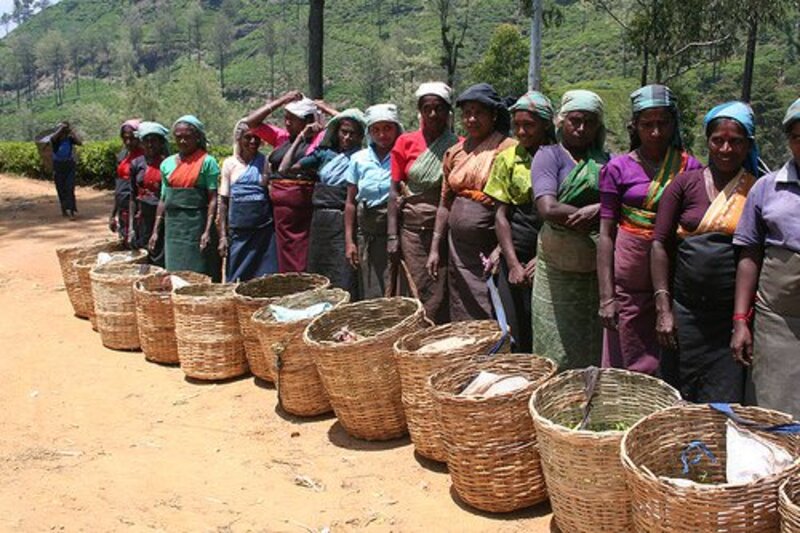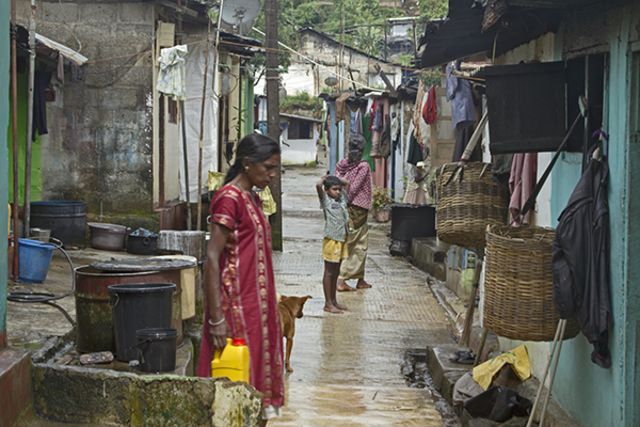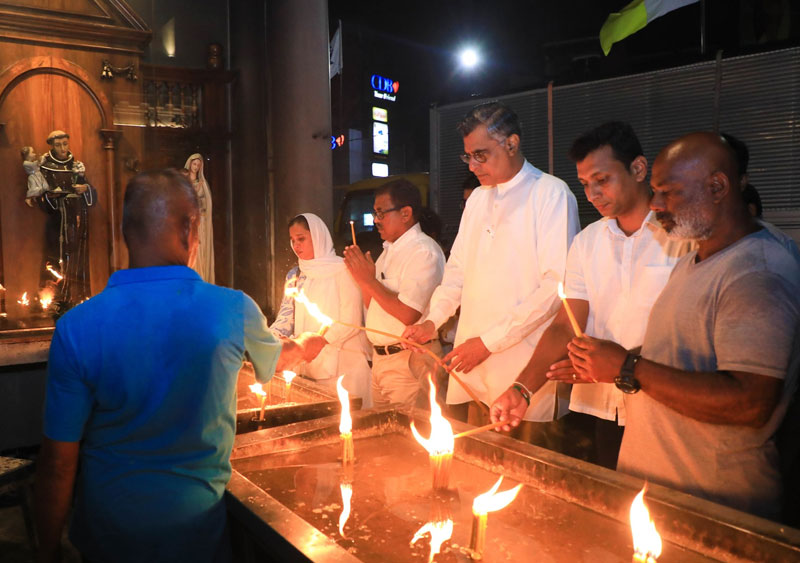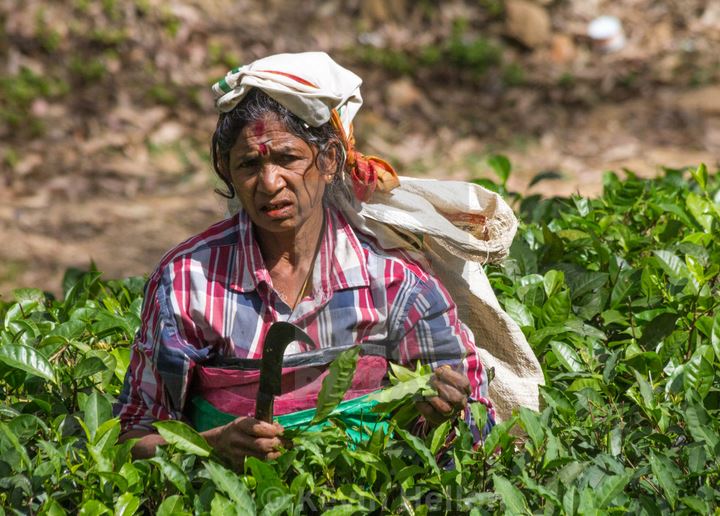Status of female workers in Plantations - Mathavakala Mathavan

"Ceylon Tea'' is known as one of the best teas in the world. Tea export is one of the main factors which contribute to the National Economy and according to Anon (2010),1.2% of gross domestic product and 16.57% of the total export income and 67.38% of agriculture export income are brought from tea exports.
200 years ago, Indian Tamils were brought from South India by colonial bondage through an organized slavery system, to create and develop Tea, Rubber, Coffee and Cocoa cultivation. Most tea growing regions in Sri Lanka are clustered mostly among the mountains of the island central massif and its southern foothills while nearly 4% of the country’s land is covered in tea plantations amounting to nearly 203,000 hectares.

Line rooms in a tea plantation in Sri Lanka
The plantation sector has its identical housing patterns known as line rooms, introduced by the colonial planters. The line rooms are barrack type structured with two hundred sq. feet for an entire family, with hardly any ventilation, no privacy for grown-up children, and overcrowding due to larger families with their dependent parents.
In the plantation sector, 185,533 families consist of the population of 777,730 who live in 163,580 housing units/line rooms. Most of these line rooms are more than 100 years old and seventy percent of them live in dilapidated conditions.
The percentage of self-owned houses among the plantation community is estimated to be as low as 10.2 and others who live in the line rooms owned by the plantation companies. Nearly 13,000 families do not have even line rooms as they live in temporary huts.
Life for the plantation community is suffering from many burning issues, such as discrimination, minimum wages, labour right violations, inequality, unemployment, power-sharing, and many more. So, the above reflections of those main issues for a common person to live on par with another community equally is extremely difficult and it creates a huge disparity between them and other communities.
Basically female workers are dominating in the workforce in the plantation. Who start their work schedule at 8.00 AM to 5.00 PM including lunch break and sometimes (depending on the target) the female workers work from 8.00 AM to 2.00 PM without a lunch break where they work continuously for 6 hours. Further, wage is determined by the collective bargaining agreement of trade union collective and regional plantation companies states Rs. 900 per day if he/she works 18 days of a month, if its below 18 days its Rs. 750 after the recent wage hike, all inclusively Rs. 1000 but they get limited number of working days.
Based on the above calculation, workers can earn if he /she works 18 days Rs.16,200, assume 25 days are given for work maximum, he/she can earn Rs. 22,500, the inflation rate in Sri Lanka averaged 10.08 percent from 1986 until 2022, reaching an all-time high of 69.80 percent in September of 2022 (www.trading economic.com). In this scenario, female workers face many challenges such as running the family and managing the financial status while undergoing a mental and physical stress.
Furthermore, male workers work from 8.00 AM to 1.00 PM and they get the same rate of wages like what the female worker gets. This is a pure gender discrimination and high labour exploitation too. Moreover, decent work conditions are completely neglected when it comes to plantation workers, No basic facilities like toilets in the field. Lack of drinking water, female workers are ill treated in their work place by their supervisors (“kankanis”) and they have to walk miles to their work locations which pose many health hazards to them. And occupational safety is also a big question mark to them, where they work in environments that are susceptible to many threats like animal attacks and inclement weather. So it is crystal clear why they look with emaciated appearance (due to overloaded/restless work and mental/physical stress).
Women in Sri Lanka have engaged themselves in different economic activities. Among different labor categories, women in the plantation sector are one of the most marginalized and exploited group of workers in Sri Lanka. Plantation women are contributing a lot to their families as income earners and taking care of the entire family makes them more exploited in their strength-wise & labour wise.
Women working as tea pluckers form the single largest segment of the plantation workforce in Sri Lanka
The smooth operation of factory-based tea processing is heavily dependent on the skillfulness and efficiency of the tea pluckers who brings in the green tea leaf. The female workers are economically far more important than male workers. Until 1978, however, female labourers were paid 20% less than male labourers. In 1978, the government passed legislation to increase and equalize plantation wages for all labour categories, thus removing the wage anomaly between male and female plantation labour that had existed in the sector since its beginning in the mid-nineteenth century. The daily wage rate for all workers in 2002 was Rs.130 for an eight-hour workday (In 2019, it was Rs. 750). The tea pluckers are also entitled to an ‘over kilo’ payment of Rs.4 per kilogram during the periods of ‘flush’. However, male labourers have the opportunity to earn extra cash by taking advantage of the plantation work schedule where men can do 'task work' that they usually complete within a few hours in the morning although they receive to pay for an eight-hour day. They can either find additional employment as a casual wage labourer in no plantation horticultural activities or engage in their productive work (Kurien, 1982).
Sri Lanka has attracted much attention as a country in which women are unusually favorable in society and the political field when compared to other countries of the SAARC region but the plantation women have been neglected and marginalized by development programmes. Plantation women’s work has been undervalued and underestimated. The economic contribution to women has not been fully recognized. Plantation women tend to have multiple roles. Women have to bear double the burden as income earners and as care-takers. As a result, they do not have leisure time on a normal working day.
Estate women are vulnerable to the oppressive economic and social structures which exist in the system that has continued to be their subordinate for over a century.
Women’s subordination is rooted in patriarchy, in the plantation families, decision making on major issues like education of children, their employment and marriage, handling of the household authority structure of the family is been decided by the husband. Women form the majority among trade union subscribers but not even 1% of the position in the decision-making level is shared by them. The isolated life led by them in the estate is another issue, most of them do not know any world beyond their estate. The female literacy rate remains lower in the plantation sector than in the other sector and the school dropout rate of females remains high. It has been recorded that only 53% of female children complete primary schooling, 24% attend secondary school and only 4% remain until GCE ‘O’ level.
According to the official records of plantations, female workers earn relatively higher incomes than men, but evidence suggests that they neither handle nor manage their earnings. To start with, the female workers do not collect their wages. Women's wages are routinely handed over to the males (husbands/ fathers) by the management and this practice was originated in the mid-nineteenth century, when the Indian Tamil labour gangs, consisting entirely of families were brought to the newly opened plantations on the island from southern India.
In 2002, 75 years after independence from the British and more than fifteen years after the large privately owned tea plantations were declared as state corporations and again after the 1995/96 privatization of plantations, female wage earnings continued to be handed over to the males.
This effectively carries on historically established norms of gender discrimination. Management personnel confirmed earlier observations that frequent family conflicts arise because men tend to waste the wages of their wives or other females on alcohol and gambling.
When focus on the financial freedom of these female workers, in the view of management, however, women do have the opportunity to collect their wages, since there is a compulsory work stoppage when wage payments are made. Plantation workers are paid twice a month and although there is a work stoppage on the formal pay-day, the vast majority of the women tea pluckers simply stay at home and male members of the household collect their wages.
It should be noted, however, that there are instances when women collect the men's wages as well. But such cases are extremely rare. On the days when ‘wage advance’ is paid, only a few plantations stopped work anyway, It may be argued that as a consequence of a long history of male control of their earnings, the Indian Tamil female tea plantation workers would have internalized the belief that they cannot manage money and voluntarily leave the management of their earnings to the males. But this does not appear to be the reality.
For instance, they have a small amount of money that they had managed to hide away in an informal savings system called 'Seettu' where the participants would take turns in receiving the pooled sum of money each month. That money is not given to the males and the women spend it mainly on the purchase of household goods and in some instances on jewelry.
In addition to the above characteristics and social realities, tea plantation workers devote their lifetime which to an outsider may seem irrational. This situation of the total institution remains almost the same as it was in the colonial period. It is the males in the family who collected the cash payment and spend it on themselves. Most of the families especially females in the household suffer and have to bear burdens mentally and physically with huge responsibility and worries in their lives. They have to earn, prepare meals, look after the family, arrange marriages and dowries for their female children, look after grandchildren, and the like. They tolerate all sorts of harassment from their drunken males. As a family, they have a peculiar lifestyle, which is different from that in the surrounding village culture. Culturally and socially, females in Sri Lankan society still behave traditionally.
This condition could be changed only through education and opportunities given to plantation women in all the aspects. Due to poverty and patriarchal mindsets, they stop their education process which should be stopped. Instead, they should be empowered to be entrepreneurs, political representatives and professionals as this is the only way forward to make their future bright.

*The writer currently serves as a project Manager in a labour organization. She holds a bachelor's degree in Human Resources Management and a Masters in Business Management and is currently reading for Masters in Gender and Women’s Studies. The writer is also an alternate member (2022) of the National Labour Advisory Council of the Ministry of Labour.

































